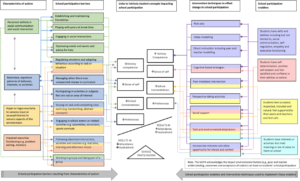| Research reference (with link) |
| Closing the Gap Between Theory and Practice Conceptualisation of a School‑Based Intervention to Improve the School Participation of Primary School Students on the Autism Spectrum and Their Typically Developing Peers
Amy Hidges, Reinie Cordier, Annette Joosten, Helen Bourke – Taylor, 2021 |
| Research methodology / Data Collection methods |
| This paper outlines an intervention designed to improve the participation of students on the autism spectrum. The intervention was developed through consultation, surveys, focus groups and studies. |
| Key relevant findings |
| Research on pupils with ASD indicates that students on the Autism Spectrum experience school participation restrictions, are more likely to experience bullying, have less social support and are more likely to be suspended than their typically developing peers. There are limited interventions available that specifically target improving student participation in school.
The authors designed a theoretical model detailing ASD characteristics, participation barriers, participation enablers and intervention techniques as shown below based on studies of relevant literature. The solid lines between the factors indicate that literature strongly supports the links between them, a dotted line indicates that there is only emerging evidence of links between them.
Social and cultural environmental factors influencing participation such as peer and teacher understanding of ASD, teacher knowledge and skills in supporting pupils with ASD etc have not been included in the model, however the authors note that these are also factors that can influence participation. To effect changes in the barriers to participation it is suggested that participation enablers are implemented through intervention strategies.
Following the literature review, surveys and focus groups an intervention programme was designed which included: (a) professional learning for teachers and school leadership staff (b) teacher-led whole class lesson plans (c) peer training for selected pupils (d) activity ideas to incorporate key whole school messages € weekly parent handouts for parents participating in the intervention. The intervention was entitled ‘In My Shoes’ and was aimed at improving the participation of primary school students between 8 and 10 years old. The intervention programme was designed to be delivered to all students, not just those with ASD, over 10 weeks, and focused on understanding strengths and differences, identifying behaviours that promote acceptance, inclusivity and a sense of feeling valued. The next steps for the study were to evaluate the feasibility, fidelity and effectiveness of the programme, therefore no conclusions have been drawn around the impact of this intervention on promoting inclusion for pupils with ASD.
|
| Questions research raises |
| How effective are our interventions to promote attendance for pupils with ASD?
How well do we educate staff and pupils on understanding ASD and recognising the barriers to participation for pupils on the Autism spectrum? |
| Further Reading |
| Bambara, L., Cole, C., Kunsch, C., Tsai, S., & Ayad, E. (2016). A peer-mediated intervention to improve the conversational skills of high school students with Autism Spectrum Disorder. Research in Autism Spectrum Disorders, 27, 29–43.
Batten, A., Corbett, C., Rosenblatt, M., Withers, L., & Yuille, R. (2006). Make school make sense. Autism and education: The reality for families today. National Autistic Society. Fletcher-Watson, S., Adams, J., Brook, K., Charman, T., Crane, L., Cusack, J., et al. (2018). Making the future together: Shaping autism research through meaningful participation. Autism, 23(4), 943–953. Hodges, A., Cordier, R., Joosten, A., & Bourke-Taylor, H. (2021). Expert consensus on the development of a school-based intervention to improve the school participation and connectedness of elementary students with ASD: A Delphi study. Focus on Autism and Other Developmental Disabilities.
|


